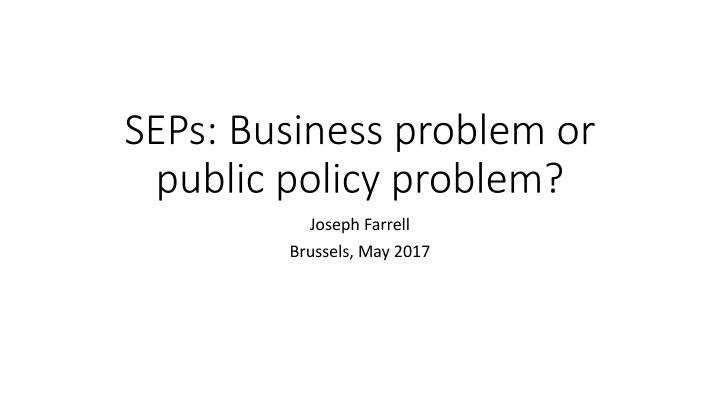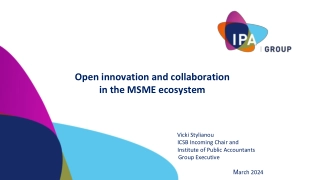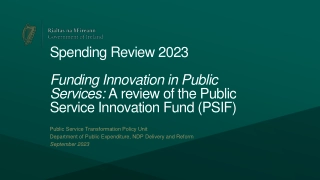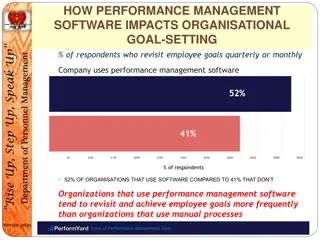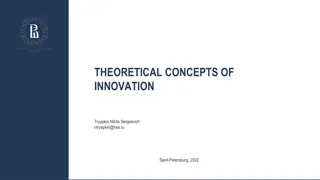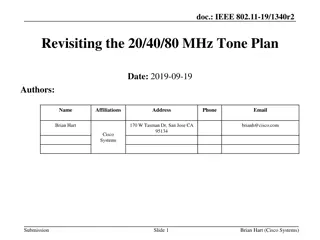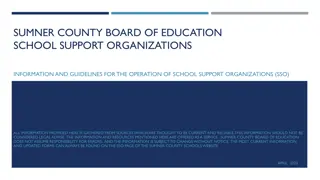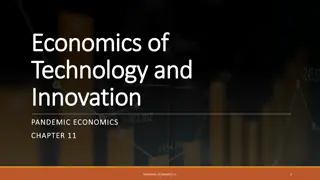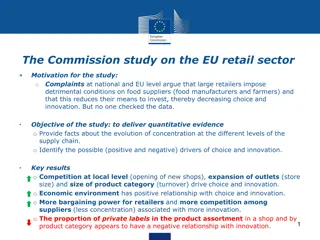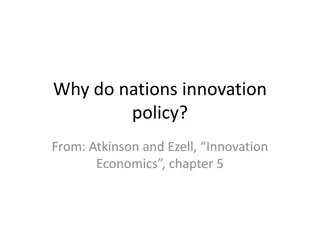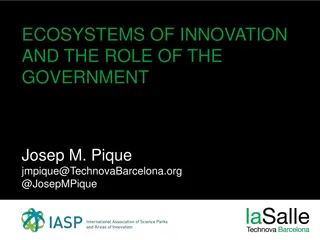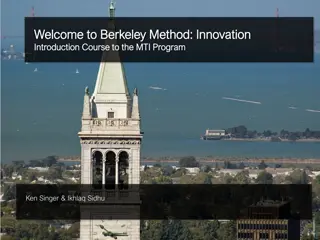Revisiting SSOs and Innovation: Challenges and Solutions
Delving into the dilemmas surrounding Standard Setting Organizations (SSOs), this piece explores the necessity for appropriate innovation opportunities while avoiding competitive issues. It contemplates various avenues for resolution, such as individual negotiations, policy announcements, and the behavior of SSOs in maximizing benefits. The discussion extends to repeated interactions, consortia, and the interplay between SSOs and government interventions.
Download Presentation

Please find below an Image/Link to download the presentation.
The content on the website is provided AS IS for your information and personal use only. It may not be sold, licensed, or shared on other websites without obtaining consent from the author.If you encounter any issues during the download, it is possible that the publisher has removed the file from their server.
You are allowed to download the files provided on this website for personal or commercial use, subject to the condition that they are used lawfully. All files are the property of their respective owners.
The content on the website is provided AS IS for your information and personal use only. It may not be sold, licensed, or shared on other websites without obtaining consent from the author.
E N D
Presentation Transcript
SEPs: Business problem or public policy problem? Joseph Farrell Brussels, May 2017
Thoughts on a revisit My 1991 visit Lots of fine recent work I won t try to quote or summarize it Some basic questions seem still to be wide open Apologies if I ve missed your paper If we can t actually have ex ante disclosure and negotiation, should we try to move closer (how?), or is that a lost cause? Are SSOs the solution (perhaps with tweaks), the problem, or what?
What is the problem? Appropriate opportunities and reward for innovation Avoid competitive problems and/or unduly high prices Not well matched for ordinary business negotiations
How might it be solved/addressed? Individual negotiations With one or both sides having announced some policies Repeated interactions Ad hoc or informal collectives Consortia, pools Formal and/or official SSOs Policies, enforcement, scope How does an SSO behave, what does it maximize? Government Direct action; constraining or requiring action by others Law enforcement (including antitrust); other policy
Repeated interactions (may skip) Incentives to evolve toward a good outcome? Clarity of what players have done and should have done? Credible (and legal) responses that largely deter but with resilience? Subgame-perfect equilibrium as usually modeled doesn t capture difficulty Rambus, others
Consortia/pools (may skip) Patent pools can reflect joint private incentive to address stacking problem, but only down to(wards) monopoly level Perhaps they will do more, but as an incentive matter, not clear why If flexible, may be challenging for participants to sustain W-CDMA, LTE attempts
SSOs and government solutions? My main focus today Who are SSOs? Business coalitions that are somewhat attuned to public policy? Somewhat privatized agents of society in somewhat governmental way? Incentives of SSOs Collective welfare (profits) of active members? Tilt toward more weight on benefits to members that might leave Exit and/or voice Putting the AND into FRAND
Evaluation Incentives How well a group s or institution s interests are aligned with society s, or with solving the problem (opportunities and fair rewards) at hand Competence Information and expertise Shadow principle: If parties negotiate in the shadow of a decision mechanism, incentives matter more than competence! More than just on average it works Errors that will be random mostly won t be allowed to actually occur Investments, decisions made before random errors occur, if they do Analogy with statistics? bias versus random error
SSO incentives (1) Does an SSO maximize something? If so, what? Collective interests of active members? Cooperative behavior in the group Side payments? If stronger incentives prevail, that implies maximization of collective interests! Suppose party A values policy ? at ??, and B values it at ??, ? = 1,2 Policy 1 prevails if ?1 ?2> ?2 ?1, or ?1+ ?1> ?2+ ?2 Internal politics? Sub-groups such as implementers, patent holders, The s/b ratio Involvement of end-users or their representatives
Participation if FRAND is membership-linked SSO with N+1 members (full industry) Policies that constrain SEP royalties to ?1 How will members evaluate slightly tighter constraint ?2< ?1? Representative member pays less and receives less How will tradeoff shift if one member would leave and charge no longer constrained ?0> ?1? For a small policy shift, ? 1 ?2+ ?0> ??1 Remaining members receive less and pay more Participation concerns (a) push toward less constraining policies, and (b) pecuniary rather than efficiency effect
Example Each firm evaluates policy at ???? ???? ? < 1 expresses that at the margin policies seek to constrain royalty level, even though that incentive is weakened by pass-through This is exploratory and broad; microfoundations also desirable If all (N+1) participate and charge ?1, then ???= ????= ??1 Each member s quasi-payoff is 1 ? ??1 If constrain members to ?2, and one non-member sets ?0, then Each member s quasi-payoff is ???2 ? 1 ?2 ?0= 1 ? ??2 (?0 ?2) Effect of ?0not only negative but undiluted by (1 ?) Equivalently, inflated by 1/(1 ?), relative to private value of constraining r
SSO Incentives (2) Pass-through and incidence of SEP royalties Relativity: competing implementers care about relative costs (including licenses) For a uniform (ND) shift, pass-through logic implies members bear less than full social cost: much is on downstream consumers But further exploration is warranted Are lump-sum royalties a marginal cost in the longer run? Sell one more phone today Effect on estimated level and trend of your sales Effect on future lump-sum licenses
FR and ND Nice people think F, R, and ND go together Economists are not so nice, and wonder Pass-through: consumers will pay, so strong ND weakens pressure for FR But it is more complicated in a bigger policy space Each implementer would value lower costs than rivals, on average or collectively, they value variation and low costs Consumers also value variation and low costs, but differently Example: simple Cournot or differentiated-product Bertrand?
Undifferentiated Bertrand Two firms, constant unit costs ?1and ?2(including royalties) (Inelastic) unit demand Joint profit is ?1 ?2 = max ?1,?2 min ?1,?2 Consumer welfare is max ?1,?2 Write ? (?1+ ?2)/2 and ? max ?1,?2 ? Then min ?1,?2 = c d Joint profit is 2d; consumer welfare is ? ? Jointly, implementers prefer YD, not ND Including royalties, collective profit is precisely inverse to consumer welfare That s extreme
Another perspective on ND Economics of exclusive dealing shows how ability to discriminate helps manipulate multiple buyers into accepting deals that harm them Relies on mechanism parallel to network effects Commit to recruiting enough buyers, and others must accede Coordination problem arises without discrimination but Do such concerns help explain role of ND in SSOs?
Government incentives and competence Rather than government or SSOs, how they interact In particular, government oversight/requirements/limits (antitrust) on SSOs Intellectual property is activist government policy Compare too-broad arguments e.g. repeated play or VI will solve Core competencies of government (maybe) Appeal to end-users/consumers; complementary to business interests? Compulsion: dangerous but valuable Participation constraint on SSO policies Protectionism and concentrated interests? Legislatures and courts
Conclusion Lots of fine work being done; much more to do! Advice to the young: be ambitious-enough! Somebody s Three Questions Institutions that address (or might address) the problems: what are the institutional incentives? Loose institutions can t necessarily be modeled as having incentives, but it s an initial way to ask the question Incentives probably matter more than internal competence The shadow principle Competence can be asked for or bought, if incentives are right including for governments
